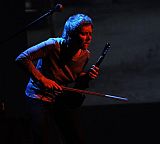
“I do not understand crossover as a constructed mergence of different musical styles. Various musical genres that interest me, from contemporary classical music, to free jazz, electronic music, punk, classical music to heavy metal are filtered by me, through my body. From this concentrate I can then create a new language, my very own specific way of expression”, says Mia Zabelka about their work.
To ascribe Mia Zabelka with the term “musician” is definitely too short and too easy. The Viennese born in 1963 is so much more in the way she moves along the interfaces of different art forms. Her refusal to commit to a single field, allows the multifaceted violinist and composer to bridge between different areas such as theater, literature and performance art. Stylistically Mia Zabelka works far off from any traditional style definitions.
Driven by curiosity, she rids herself of the tight corsets of fixed concepts and pursues new paths that have yet remained unexplored and almost unheard. With the meticulousness and curiosity of a scientist, the e-violinist and composer tries again and again to shuffle the boundaries of what is possible and to elicit new facets from the already wide spectrum of her own sound.
A central role in her work is the methodology she refers to as “automatic playing”, which she developed over many years. Derived from Friederike Mayröcker’s approach of “automatic writing”, it simply means creating art “out of the body.” This approach allows the violinist, who has quasi converted herself to a sound generator, to steer improvisations in a new way without having to take on fixed parameters or regard fixed musical laws. Moreover, it seems as if the way is the goal, the process itself, which results only sound at the end.
The mutiple award winner Mia Zabelka studied composition at the Vienna Conservatory with Kurt Schwertsik and violin with Alexander Arenkov. This was followed by the studies of electro-acoustic music with Roman Haubenstock-Ramati and Dieter Kaufmann at the University of Music and Dramatic Arts. After that the sound artist concert toured across Europe, the United States, as well as in the former Soviet Union.
In the following years, Mia Zabelka succeeded more and more in establishing an an excellent reputation in the international sound art scene. For example, she was invited as a “composer in residence” at the prestigious art institution St. Peter in Cologne. In addition, she worked at the Electronic Studio of WDR, the ZKM / Karlsruhe, STEIM / Amsterdam and at the Experimental Studio of the Warsaw Radio responsibility. Mia Zabelka was also commissioned by reknowed music institutions, including the Salzburg Festival, the Ars Electronica, the Styrian Autumn, Jeunesse Vienna and for the Vienna Festival Weeks
Open to all directions, Mia Zabelka has musically collaborated with very different formations over the past years. For instance in 2002, when she initiated together with the Viennese electronic DJ Electric Indigo the highly acclaimed project “colophony circuit”. Only a year later she founded the One.Night.Band with the Croatian electro-acoustic musician Zahra Mani.
From 1995 to 2000, the artist worked as the artistic director at the Klangturm St. Pölten. Since 2007, Mia Zabelka has been managing the klang.haus, which she founded in the Styrian Untergreith and which has established itself as a major international center for events in the field of sound art. This year, the violinist and composer will curate the Viennes sound art festival “phono femme” in October.
Michael Ternai
translated from the German by Doris Miyung Brady
http://db.musicaustria.at/en/node/67878
